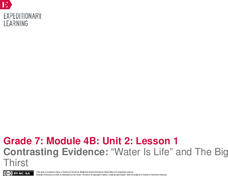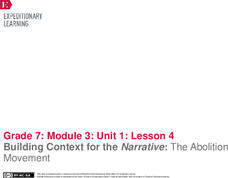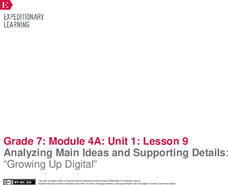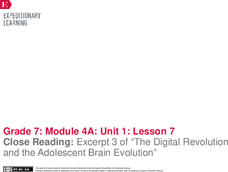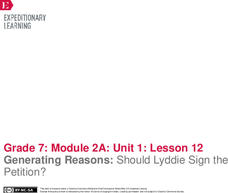EngageNY
Finding Relevant Information and Asking Research Questions: The Big Thirst
Let's get to the gist. As scholars continue their study of Charles Fishman's The Big Thirst, they practice writing the gist of the text. Additionally, pupils add notes about the industrial uses of water to their researcher's notebooks.
EngageNY
Contrasting Evidence: “Water Is Life” and The Big Thirst
Sometimes differing arguments support the same claim. Scholars complete a graphic organizer comparing how two authors support the claim that people need to better manage the world's water supply. Pupils also complete a graphic organizer...
EngageNY
Mid-Unit Assessment, Part II: Research Task: Comparing and Contrasting Texts
When it comes to comparing texts, it's apples to oranges. As part two of the mid-unit assessment, learners compare and contrast two texts about the Internet and brain health. While reading, scholars use a Venn diagram to compare two...
EngageNY
Choosing a Position: Screen Time and Adolescents
Time to pick a side! Building on the Fishbowl activity from the previous instructional activity, scholars choose a position about whether the American Academy of Pediatrics should raise its screen time recommendations. Using notes,...
EngageNY
Contrasting Evidence: “Games Can Make a Better World” and “Video Games Benefit Children, Study Finds”
Anecdotes, analogies, testimonies, statistics. The most powerful arguments rely on multiple types of evidence. Scholars explore the topic as they read contrasting evidence about the benefits of video games. They complete Venn diagrams to...
EngageNY
Finding Relevant Information and Asking Research Questions: The Benefits of Video Games
Video games may not be so bad after all. As scholars read the text "The Many Benefits, for Kids, of Playing Video Games," they summarize the gist in their researchers' notebooks. Next, pupils draft supporting research questions based on...
EngageNY
Clarifying Thinking on Water Management: Revisiting the Gallery Walk
One, two, three, go! Scholars gather in triads and number themselves one to three. Each number is responsible for sharing a section of the map homework completed the night before as learners discuss domain-specific vocabulary terms using...
EngageNY
Analyzing Douglass’s Purpose
Class members continue analyzing text excerpts from Narrative of the Life of Frederick
Douglass. They read and draw conclusions to determine Douglass's view on slavery. Learners finish by discussing with partners how the excerpts connect...
EngageNY
Building Context for the Narrative: The Abolition Movement
That's history. Scholars work together to review the text Abolition and its accompanying text-dependent questions. They then determine what information to add to the Historical Context anchor chart. For homework, individuals think of...
EngageNY
Building Context for the Narrative: Slavery in America
Scholars use an Analyzing Images: Slavery in America handout to make predictions from pictures featuring slavery. They then discuss the pictures with partners. Learners further their thinking by close reading The Slave Trade and...
EngageNY
Close Reading Excerpt 2: Plantation Life
Time for a good old fashioned match game! Readers complete an initial, second, and third read of Plantation Life to gain a deep understanding. After close reading the text, scholars practice identifying paraphrasing by matching sentences...
EngageNY
End of Unit Assessment: Analyzing an Informational Text
Scholars wrap up the unit by taking an assessment and reading the informational text "You Trouble" by Justin O'Neill. As they read, they answer multiple-choice questions and complete charts to analyze the main idea and supporting details...
EngageNY
Analyzing Main Ideas and Supporting Details: “Growing Up Digital”
Young scholars continue their exploration of adolescent brain development by reading an informational text, "Growing Up Digital," by Matt Richtel. Then, with partners, they complete note-catcher worksheets to capture the article's main...
EngageNY
Close Reading: Excerpt 3 of “The Digital Revolution and the Adolescent Brain Evolution”
It's time to level up and discover how video games affect the brain. Pupils explore the topic as they continue reading excerpts from an article about adolescent brain development and the digital revolution. Scholars also participate in a...
EngageNY
Analyzing Character: Eliza Character Pyramid
Building a pyramid is not as hard as it looks! Scholars analyze the character of Eliza in Pygmalion by crafting a character pyramid about her. After discussing a model pyramid, pupils receive a blank Eliza Doolittle Character Pyramid to...
EngageNY
World Café about Pygmalion
Round and round you go. Scholars participate in a World Cafe to discuss Pygmalion. As they circulate around to different groups, they talk about three main questions that pertain to the actions of Eliza and Higgins. After circulating,...
EngageNY
Writing an Argument Essay: Developing Claims and Reasons
Scholars begin working on the end-of-unit writing prompt for Pygmalion. They must analyze their collected text evidence to determine what information is compelling enough to include in their argumentative essays. The teacher guides them...
EngageNY
Text-to-Text Connections: Pygmalion
Scholars refer to a British Dialect/Slang anchor chart as they answer text-dependent questions over section eight of Pygmalion. While learners work on the questions, the teacher conducts check-ins on the progress of their independent...
EngageNY
Analyzing: Key Scenes in Pygmalion
Class members work on Pygmalion section seven text-dependent questions. They then act out part of the play in a reader's theater and finish the lesson plan by revisiting their Eliza Character Trackers, adding any new information they...
EngageNY
Mid-Unit Assessment: Evidence and Inference in Pygmalion
Scholars complete the Pygmalion mid-unit assessment to show their progress toward the unit's stated goals. The assessment requires learners to read text and successfully answer multiple choice and extended response questions.
EngageNY
Reading More Closely: Inferences and Evidence in Pygmalion
Learners read in section five of Pygmalion about Eliza's words and actions that shock the Victorian crowd. They answer text-dependent questions about the section, and then work with partners to add more details to their Eliza Character...
EngageNY
Generating Reasons: Should Lyddie Sign the Petition?
Scholars synthesize evidence from Katherine Paterson's Lyddie to create a list of the pros and cons of Lyddie signing a petition about working conditions. They use the Lyddie's Decision anchor chart to record their thoughts and ideas...
EngageNY
Forming Evidence-Based Claims: Should Lyddie Sign the Petition?
Pupils reread selected passages from Katherine Paterson's novel Lyddie. After they finish, individuals gather textual evidence supporting whether Lyddie should sign a controversial petition and record their findings on graphic organizers.
EngageNY
Framing Lyddie’s Decision and Practicing Evidence Based Claims
Scholars grapple with whether the title character of Katherine Paterson's novel, Lyddie, should sign a petition about working conditions at the factory. They engage in close reading and discussion before adding their thinking about the...



